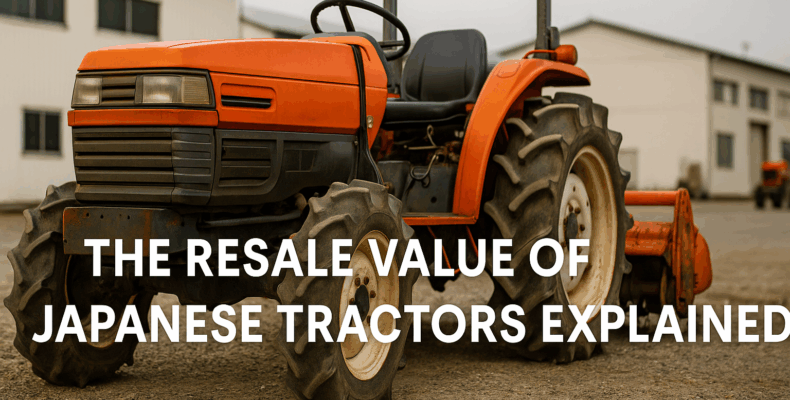The Resale Value of Japanese Tractors Explained
When investing in farm equipment, resale value is a key factor for long-term success. Japanese tractors are well-known worldwide for durability, reliability, and cost-effectiveness. These qualities not only make them popular among farmers but also ensure that they maintain strong value when resold.
Why Japanese Tractors Retain Their Value
Firstly, Japanese brands such as Kubota, Yanmar, Iseki, and Mitsubishi are built with advanced engineering. Their engines are efficient, and their components are designed to withstand heavy use. As a result, buyers know that even after years of operation, these machines will perform dependably.
Secondly, Japanese tractors are often well-maintained before being exported. Farmers in Japan follow strict inspection standards, and many machines come from light use on smaller farms. This consistent quality reassures international buyers, which naturally supports higher resale prices.
Moreover, global demand drives resale value. Farmers across Africa, Asia, and South America specifically look for Japanese tractors because of their proven track record in challenging environments.
Key Factors Affecting Tractor Resale Prices
-
Brand Reputation: Popular brands like Kubota and Yanmar usually sell at a premium.
-
Maintenance History: Tractors with regular servicing and clear records fetch higher prices.
-
Age and Usage Hours: Machines with fewer working hours naturally hold better value.
-
Tire and Engine Condition: Strong performance indicators help buyers trust the investment.
-
Export Market Trends: When demand rises in regions like Africa or South Asia, resale prices often increase.
Examples from Global Markets
-
In Zambia and Kenya, small-scale farmers buy Japanese tractors because they are affordable yet reliable. After a few years, these tractors can still be sold locally at competitive prices.
-
In South America, larger agricultural businesses purchase used tractors from Japan, use them for commercial operations, and later resell them to smaller farms.
-
In Asia, demand for compact tractors with fuel efficiency remains strong, which keeps resale values stable.
This cycle of buying, using, and reselling proves that Japanese tractors are more than just farming tools—they are valuable assets that generate long-term returns.
Choosing the Right Export Partner
To benefit from strong resale value, buyers must work with trustworthy exporters. Reliable companies ensure tractors are inspected, shipped securely, and priced fairly.
We recommend reading this guide:
👉 Top 5 Trusted Japanese Used Truck Exporters for Global Buyers
This article highlights five of Japan’s leading exporters. These companies have proven experience not only in trucks and buses but also in supplying tractors to international markets. Partnering with them gives buyers confidence and protects their investment.
Final Thoughts
In conclusion, Japanese tractors hold exceptional resale value thanks to their engineering quality, global demand, and reliable performance. For farmers, they represent both an essential farming tool and a smart financial investment.
Therefore, when planning to import a tractor from Japan, it is wise to work with exporters who can deliver the best quality and service. By doing so, buyers can maximize the tractor’s productivity today and its resale value tomorrow.
